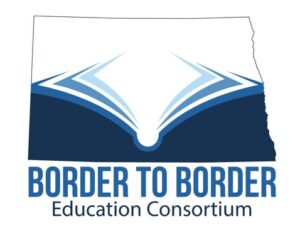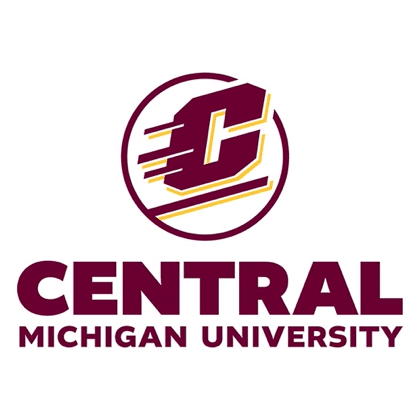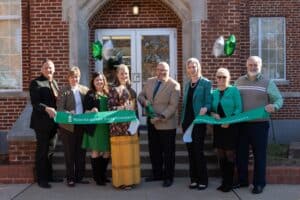15 Jul2024
By UNI College of Education
More than 60 new educators are ready to launch their own elementary school classrooms for the first time, thanks to an innovative new program at the University of Northern Iowa. This group of teachers are the first graduates of the Purple Pathway for Paraeducators program, which launched in 2022 to provide practicing paraeducators a pathway for earning a bachelor’s degree in elementary education.
“This program involved a large amount of work, across multiple departments at the University of Northern Iowa. Thanks to this program, we now have 62 new elementary educators ready to lead their own classrooms,” said Colleen Mulholland, dean of UNI’s College of Education.
15 Jul2024
By Dickinson State University
 Dickinson State University (DSU) and Mayville State University (MSU) are proud to announce the establishment of the Border to Border Education Consortium. This innovative partnership aims to enhance educational opportunities and resources across North Dakota by combining the strengths of both institutions. The first programs to be launched under this consortium will focus on mathematics and chemistry education, with further exploration into music education programs.
Dickinson State University (DSU) and Mayville State University (MSU) are proud to announce the establishment of the Border to Border Education Consortium. This innovative partnership aims to enhance educational opportunities and resources across North Dakota by combining the strengths of both institutions. The first programs to be launched under this consortium will focus on mathematics and chemistry education, with further exploration into music education programs.
Holly Gruhlke, DSU vice president, expressed her enthusiasm for the new collaboration, stating, “This consortium represents a significant step forward in our mission to provide accessible, high-quality education to students across the state. By pooling our resources and expertise, we can offer programs that are both comprehensive and innovative. The collaborative efforts between our institutions will lead to a richer educational experience for our students. We are excited to begin exploring additional program opportunities.”
15 Apr2024
By Amy Kline
The New Jersey Department of Education (NJDOE) strives to recognize educators who have gone above and beyond in their service to New Jersey’s students. All local educational agencies (LEAs) are encouraged to participate in its Governor’s Educator of the Year program to honor the hardworking teachers and educational services professionals for their dedication to students, and to the profession.
As part of this distinguished state program, the New Jersey Association of Colleges for Teacher Education (NJACTE) welcomes the teachers chosen to speak at a monthly membership meeting and invites them to share their thoughts about education. What follows is a post authored by 2024 NJ Teacher of the Year, Joe Nappi on the topic of difficult conversations.
02 Apr2024
A 2024 AACTE Session Recap and Reflection
By Mayra Marquez-Mendez
The session “Diversifying the Teaching Profession: Strategies for Success” provided invaluable insights into evaluating, reimagining, and implementing supportive models for diversifying the teaching profession. The presenters reflected and provided various perspectives to emphasize the importance of having a diverse teaching workforce to support culturally and linguistically diverse students across the United States. Key highlights from the presentation include the importance of providing high-quality instruction for our students, which begins with teachers, leaders, and districts nationwide through excellent lines of work in teacher preparation, professional learning, education policy, and diversity, equity, and inclusion by explaining local and national strategies to diversify the teaching profession.
In this session, the discussion centered on the need to diversify the teaching profession locally and nationally. More specifically, the focus was on the innovative work being done by The Public Education Business Coalition (PEBC) in Colorado, which has a proven track record of successfully reaching and attracting a diverse pool of potential educators across the United States. With a national reach, the PEBC is leading the charge in promoting high-quality instruction by collaborating with teachers, leaders, and districts nationwide. Their work spans various areas, including teacher preparation, professional learning, education policy, diversity, equity, and inclusion. By leveraging their expertise in these areas, the PEBC is helping to create a more inclusive and equitable teaching profession that better reflects the diverse student population in our schools.
01 Apr2024
By Karenna Glover
 ReAction Virtual, the no-cost skills-based learning conference, hosted by GoReact, is set for April 10-11. Don’t miss this event featuring two half-days of workshops, panels, and thought leadership sessions featuring a wide range of topics including AI, assessment strategies, career readiness, and much more.
ReAction Virtual, the no-cost skills-based learning conference, hosted by GoReact, is set for April 10-11. Don’t miss this event featuring two half-days of workshops, panels, and thought leadership sessions featuring a wide range of topics including AI, assessment strategies, career readiness, and much more.
01 Apr2024
By The Office of the State Superintendent of Education (Washington DC)
The Office of the State Superintendent of Education (OSSE) announced the expansion of a popular and successful educator coaching program, which will provide free instructional coaching to 75 DC public and public charter teachers who have completed DC Educator Preparation Provider (EPP) programs and have fewer than five years of teaching experience. This work builds on OSSE’s 2023-24 school year school leader coaching, which served nearly 200 school leaders who support over 2,000 DC school-based educators.
“OSSE is proud to provide this coaching opportunity for new teachers who have completed their teacher training right here in the District,” said State Superintendent Christina Grant, Ed.D. “To improve student outcomes, teachers must be well prepared and well supported from the minute they set foot in the classroom, and investing in this one-on-one coaching resource will provide new teachers with the support they need to improve their instructional practice and ultimately make a meaningful impact on the social and academic success of DC students.”
11 Mar2024
By Hadlee Rinn
 A group of teacher educators from the College of Education and Human Services and College of Science and Engineering at Central Michigan University (CMU) received a grant from the National Science Foundation to help college students become familiar with the core teaching practices, which are ideas or actions teachers follow to support learning. Additionally, the core teaching practices are demonstrated to have the greatest impact on student learning and were adopted by the Michigan Department of Education several years ago.
A group of teacher educators from the College of Education and Human Services and College of Science and Engineering at Central Michigan University (CMU) received a grant from the National Science Foundation to help college students become familiar with the core teaching practices, which are ideas or actions teachers follow to support learning. Additionally, the core teaching practices are demonstrated to have the greatest impact on student learning and were adopted by the Michigan Department of Education several years ago.
“We chose to focus on [the core practices of] building respectful relationships with students and modeling and explaining content. […] I would argue these are two of the more important teaching practices [because] if you’re going to teach students and have them learn effectively, you need to have a good relationship with them,” Kevin Cunningham, Ph.D, the lead principal investigator on the project said. “The ability to take what is challenging content and make that clear and intelligible to students [is important].”
26 Feb2024
By Megan Simpson
The power of partnerships is more than a talking point for Prentice Chandler, Ph.D., dean of the Eriksson College of Education at Austin Peay State University. These partnerships are elevated, celebrated, and taken seriously, and this attitude was fully apparent as the College of Education hosted its semiannual Partnership Advisory Council Meeting on February 15.
“These two meetings that we have each year are some of the most important work in the college,” Chandler said. “We can do just about anything if we work together.”
University-district partnerships are essential and have resulted in some of the college’s nationally recognized programs, including the Grow Your Own Teacher Residency. The Partnership Advisory Council is a collaborative effort that brings together Austin Peay faculty and staff with school district leaders and stakeholders from across Tennessee. These meetings allow the college to share updates on its programs and initiatives and gather feedback from partners to help guide improvements.
26 Feb2024
An #AACTE24 Session Recap and Reflection
By Charles A. Barnes II, JD
Attending the AACTE 2024 Annual Meeting Featured Session, “Competency-Based Education & Teacher Education: Next Steps” provided invaluable insights into reimagining traditional higher education models. The presenters compellingly reasoned how competency-based programs can bolster equity and accessibility by offering flexible, personalized pathways for a diverse range of learners (Patrick, 2021). Key highlights included the backward design process for developing competency-based curricula and the significance of authentic, performance-based assessments.
The session underscored how competency-based education fundamentally shifts the focus to actual student learning and the application of knowledge. As discussed, students progress by demonstrating mastery of real-world teaching competencies, rather than by accumulating seat time or credits (Klein, 2013). This mastery-based approach accommodates individual pacing and learning needs, thereby making teacher licensure more attainable for non-traditional students.
22 Feb2024
By UNLV News Center
As more Nevada teachers join the workforce to shape and educate the youth in the state, and as technology continues to advance, it is important to build confidence in educators who teach STEM. Enter the Nevada STEM Co-Lab Project.
A collaborative partnership between the University of Nevada Las Vegas (UNLV) College of Education and Center for Mathematics, Science, and Engineering; the Desert Research Institute (DRI); and the National Institute for the Advancement of Education — the Nevada STEM Co-Lab project aims to bridge formal and informal education in Nevada communities by providing access to curriculum-centered STEM activities and training for educators.
“This project has been a nice collaboration between UNLV and DRI. It was a successful partnership and is paving the way for additional proposals and ongoing collaboration,” said Hasan Deniz, a science education professor in the Department of Teaching and Learning.
The project comes from a congressionally directed STEM grant with three important parts. “The overall grant was to support the development of the STEM Co-Lab, or the technology learning space in our Las Vegas DRI campus, as well as the development of 16 new Green Boxes covering kindergarten through fifth grade,” said Emily McDonald-Williams, STEM Education program manager for DRI.
06 Feb2024
By Jason Moody
The Tennessee Grow Your Own Center, a partnership between the Tennessee Department of Education (TDOE) and the University of Tennessee System, has been awarded a $1.8 million grant over two years by Ascendium Education Group to strengthen the teacher talent development pipeline across Tennessee, by increasing the number of individuals enrolling in teacher education programs and improving the retention of existing teachers.
The grant will fund the development of the Registered Teacher Apprenticeship Program of Study (RTAPS) which will be an online curriculum developed by faculty fellows in the Institute for Competency-Based Teacher Education (ICBTE). This program provides Educator Preparation Providers (EPPs) and Local Education Agency (LEA) leaders with secure access to standards-based curriculum, that includes topics such as planning for instruction, family and community collaboration, and learner development.
“We are incredibly grateful for the support of Ascendium Education Group. These funds equip EPPs to create flexible, high-quality, low-cost educator preparation pathways that are accessible to aspiring educators from every community. Funding also provides opportunities to use virtual simulations to enhance teacher skill development,” said Erin Crisp, executive director of the Tennessee Grow Your Own Center.
08 Jan2024
By Deborah Boyd
This blog article is part of the Global Education Faculty PLC Professional Development Series, sponsored by the Longview Foundation. The writing series aims to elevate the perspectives of international scholars, including teacher educators, graduate students, and alike, to offer insights into how Educator Preparation Programs (EPPs) can integrate intercultural understanding within their programs. AACTE members interested in participating in the series should contact Brooke Evans at mailto:bevans@aacte.org.
Faculty members often help candidates build intercultural understandings during individual courses. Still, embedding this into already packed teacher/leader preparation at a programmatic level can be a challenge. Those of us in educator preparation programs (EPPs) can agree with Andreas Schleicher, Organization for Economic Cooperation and Development’s (OECD) director for education and skills, who says, “It takes deliberate and systematic efforts to create the global competence through which we can share experiences, ideas, and innovation with others, and increase our radius of trust to other countries and cultures.”
Programmatic global competence requires intentional planning, consistent implementation, and thoughtful reflection to ensure candidates see these understandings as integral to teaching and leading. While every college develops these skills differently, in this blog I detail some of the ways our college works to integrate intercultural understanding, depending on the level (undergraduate, post-baccalaureate, graduate) and the program (teacher or leader).
08 Jan2024
By Michael Bratton
AACTE Teacher Stories is a series highlighting the experiences of K-12 educators who are attending or alumni of AACTE member institutions. AACTE invites preservice and in-service school teachers to reflect on how they are applying the practices, frameworks, and strategies they acquired during their educator preparation program (EPP) studies to assure student success. Please email submissions to Tyler Pointer at tpointer@aacte.org.
A Bowling Green State University (BGSU) graduate student was recently recognized for her exceptional performance in the classroom by receiving the Emerging Leader Award from the Ohio Council of Teachers of Mathematics — an honor given to a current mathematics pre-service teacher or a mathematics educator who has taught for five years or fewer.
Kaitlyn Solymosi ’22, who earned a bachelor’s degree in integrated mathematics education and has been involved in the University’s Math Camp, Math Emporium, and was a Thompson Family Scholar, said she found herself immersed at BGSU from the start.
“I was going to math conferences as a freshman, and I joined the math-ed community way before I was in my own classroom student teaching,” Solymosi said. “My experience at BG was definitely more than I expected to get out of a math-ed degree.”
03 Jan2024
NM Residencies Program Provides Aspiring Teachers with Classroom Experience
By Nate Williams
The New Mexico Public Education Department (NMPED) has been awarded a five-year, $8 million federal grant for NM Residencies, a statewide initiative to provide aspiring teachers with a year of co-teaching alongside an accomplished mentor teacher as part of their pre-service preparation program.
The grant, part of the U.S. Department of Education’s (ED) Education Innovation and Research Program, will provide much-needed research, infrastructure, and implementation support for NM Residencies.
12 Dec2023
By Northeastern State University

RCTE ribbon cutting Tahlequah: NSU officials gather to cut the ribbon on the new RiverHawk Center for Teacher Excellence in Tahlequah on November 13.
Northeastern State University celebrated the opening of the RiverHawk Center for Teacher Excellence with ribbon cuttings on the Tahlequah and Broken Arrow campuses on November 13.
NSU was awarded a four-year grant totaling more than $1 million through the Augustus F. Hawkins Centers of Excellence Program to open the centers with the goal of increasing the number of comprehensively prepared teachers from diverse backgrounds.
Through this grant, NSU can help potential education majors, teacher candidates and current teachers be successful in their career journey to become certified, impactful and employed teachers by providing a comprehensive, positive and supportive environment for them to learn and grow.







 Dickinson State University (DSU) and Mayville State University (MSU) are proud to announce the establishment of the Border to Border Education Consortium. This innovative partnership aims to enhance educational opportunities and resources across North Dakota by combining the strengths of both institutions. The first programs to be launched under this consortium will focus on mathematics and chemistry education, with further exploration into music education programs.
Dickinson State University (DSU) and Mayville State University (MSU) are proud to announce the establishment of the Border to Border Education Consortium. This innovative partnership aims to enhance educational opportunities and resources across North Dakota by combining the strengths of both institutions. The first programs to be launched under this consortium will focus on mathematics and chemistry education, with further exploration into music education programs.
 A group of teacher educators from the College of Education and Human Services and College of Science and Engineering at Central Michigan University (CMU) received a grant from the National Science Foundation to help college students become familiar with the core teaching practices, which are ideas or actions teachers follow to support learning. Additionally, the core teaching practices are demonstrated to have the greatest impact on student learning and were adopted by the Michigan Department of Education several years ago.
A group of teacher educators from the College of Education and Human Services and College of Science and Engineering at Central Michigan University (CMU) received a grant from the National Science Foundation to help college students become familiar with the core teaching practices, which are ideas or actions teachers follow to support learning. Additionally, the core teaching practices are demonstrated to have the greatest impact on student learning and were adopted by the Michigan Department of Education several years ago. 